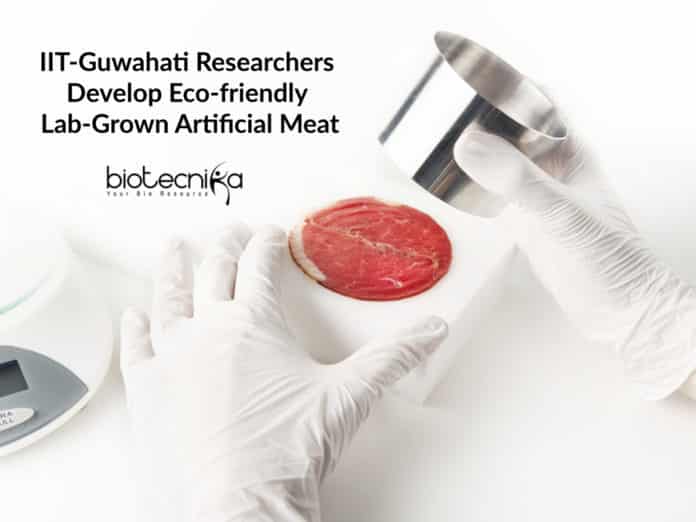IIT-Guwahati Researchers Develop Eco-friendly Lab-Grown Artificial Meat
Eat meat without killing animals
Here comes good news for all those non-vegetarians who are constantly looking out for meat from cruelty-free food sources or say without killing animals. Some researchers from the Indian Institute of Technology, Guwahati (IIT-G) have recently developed lab-grown artificial meat as an alternative to traditional meat, which is a great boon to save animals that are mostly killed for meat production. Apart from being environment-friendly and cruelty-free, lab-grown artificial meat such as the ones produced by the IIT researchers, who have devised a way to produce tissue-engineered meat is, also totally customizable since they are ‘bred’ using tissue culture.
The development of lab-grown meat has been made by researchers of the biomaterial and tissue engineering laboratory who took different kinds of cells from animals through biopsies. Certain cells such as muscle progenitor cells, fat cells, bone cells or cartilage cells were then grown in separate layers that had been developed.
Dr. Biman B Mandal, Associate Professor, Department of Bioscience and Bioengineering said that the lab-grown artificial meat will be comparable to that of the raw meat in terms of its nutritional value and taste and this is “completely natural”. Researchers from IIT-G have now applied for a patent for this lab-grown artificial meat.
He added that usage of external chemicals like hormones, animal serum, growth factors or antibiotics have been restricted in this preparation for meat, hence it is very safe on ethical concerns.
The most fascinating aspect of the lab-grown artificial meat is how the meat can be made lean or fatty by manipulating the production method. The lab-grown artificial meat can also be converted into solid dry meat products in various shapes and sizes. Mandal also mentioned that the daily edible components are being used to make the support matrix in order to increase the nutritional content of the meat product.
Mandal added that tissue-engineered meat production can yield a hundred chickens from approximately one chicken. He also hoped that the new form of lab-grown artificial meat developed in the institute will attain high sales figures in both national and international markets
Dr. Mandal expressed his concerns about the immense pressure faced by the meat industry amid a growing population. In a 2010 United Nations report it was stated that our meat and dairy demands will be unsustainable by the year 2050. Mandal, speaking about the livestock industry’s contribution to waste-water, added that it takes 4,000L of water to produce about 1kg of chicken meat and more than 8,000L of water is required to produce 1 kg of mutton.
Apart from a large number of animals being killed for their meat, water is also wasted in large quantities for livestock production so this kind of tissue-engineered lab-grown artificial meat is indeed an excellent way of solving the problems faced during livestock production in addition to providing meat as per the customer’s needs and demands.
Will India Adopt Lab-Grown Artificial Meat?
For Indian biotechnology as well as food technology startups, a research study in these areas can be the dawn of a brave world of development in the food market. Actually, startups need to consider leveraging such research and also bringing it to market with their business acumen. There’s not much private innovation happening in this space amongst Indian startups as the research study itself is extremely cost-intensive. Which is why the requirement of the hour for start-ups aiming to disrupt this space is to tie-up with the academic community and also public-sector research study laboratories to locate means to bring new-age food to the marketplace.































Full marks for innovation, and for the *visible* economic advantages of lab-grown meat. But no mention of the possible effects on health! Or is it conveniently assumed that since it is meat cultured from real animal tissue, it’ll be no different from it?? We unfortunately have a work culture of short-sighted planning, with all manner of financial and political expedience. Even today, GMO products are in the market in huge numbers – unlabelled, unmarked, undocumented and unregulated. Lab-grown meat will enter in the same way. The consumer must have a choice and he or she must be able to exercise this choice.
Thank you for covering our latest research.
Is it safe for human consumption? Is there any study made on affect and it may cause, after consumption for 5 years, 7 years, 10 years and in 20 years it may cause neurological disorder. Anything which is not in nature should not be consumed, otherwise, there is a chance of cancer, this one of the reason why cancer is increasing in society specially in India.